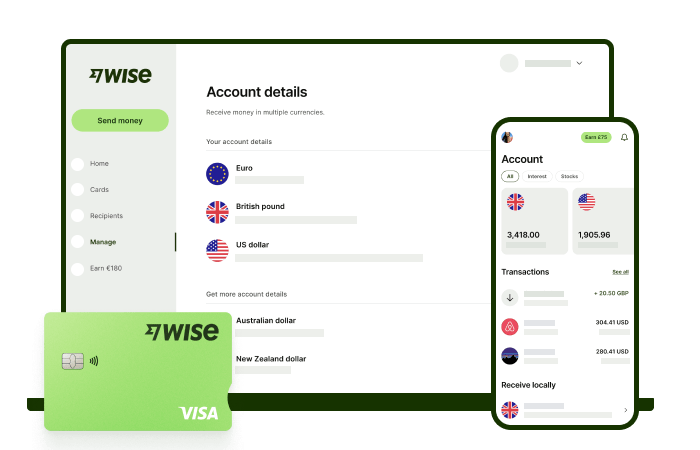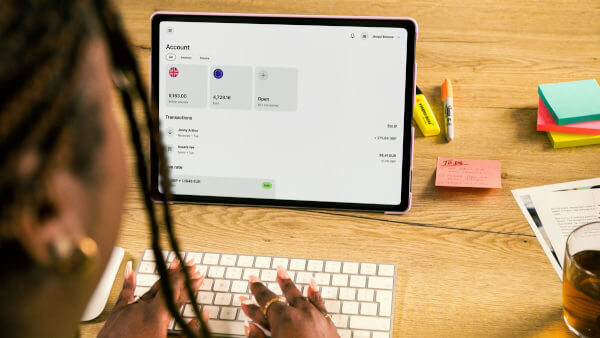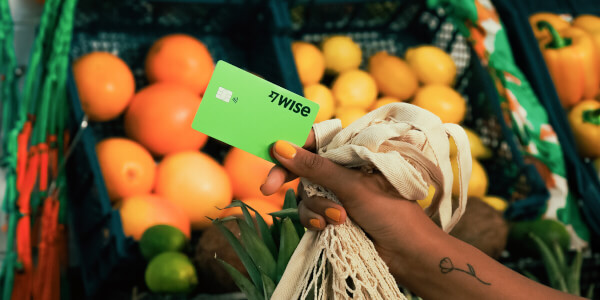Wise ACH vs wire guide
Everything you need to know about using Wise for USD transfers and paying via ACH vs wire

Personal finance expert Emma Lunn shares 5 key things that you need to know when you move to the US. From getting paid to getting healthcare, here’s how to adjust your finances in your new home. Oh, and how to get your head around tipping...
From being a city slicker in New York, living the Aloha lifestyle in Hawaii, or leaving civilisation behind by moving to Alaska, the US has a vast array of lifestyles on offer.
So it’s no wonder that each year thousands of Brits pack their bags and head for a Stateside adventure. But whether you’re planning to move to the US to boost your career, escape the dreaded Brexit fallout, or just for a change, you need to get your finances sorted.
Here are 5 tips to get you started.

The US visa system is not only confusingly complex but contains some interesting terms.
For example, are you “an alien with extraordinary ability”? Rumour has it Melania Trump initially used the so-called “Einstein visa” to move to the US from her native Slovenia. The mind boggles.
For mere mortals, you’ll need to look at a non-immigrant work visa, immigrant visa, or a fiancé visa (if you can find a US citizen to marry you). Another option is theGreen Card Lottery which randomly hands out about 50,000 visas a year.
You’ll need a social security number (SSN) to work in the US. You can apply for a SSN at the same time as your visa.

The biggest retail banks in the US include Chase, Capital One Bank, Citibank, Bank of America and Wells Fargo.
Journalist Alex Cardno moved to New York in 2014 and looked at several banks before making an application. He says: “They all required proof of legal / residential status such as visa or green card, and a signed apartment rental agreement etc, plus a social security number and an address for correspondence.
“I went with Bank of America and there was a monthly fee charged if my balance went below $1,500 until, or unless, my salary was paid into that account. That’s quite common among US banks. Once my salary was being paid into that account, any non-overdraft balance fees were waived.”
Some UK banks, such as HSBC and Barclays, have a presence in the US so if you have an account with one of these you may be able to get set up with a US checking account before you go.

At some point you’ll want to exchange British pounds into US dollars.
When doing so, it’s important to look at both the exchange rate and any charges. Using your bank might be convenient but it almost certainly won’t be the cheapest option.
A Transferwise borderless account might be the answer. It allows customers to quickly and conveniently switch between multiple currencies for a fair price, and comes with a snazzy green Mastercard debit card which means you can easily spend abroad in different currencies.
You’ll get local bank account details for both the UK and the US (plus Australia, Europe and New Zealand) – so you can get your US salary paid into your Transferwise account if you want to. It'll help you manage your finances while you're looking for a bank account, too.

There’s no NHS-equivalent in the US. In short, if you get sick and need medical treatment, you’ll have to pay for it.
Most US employers offer a minimum level of health insurance for employees and their families, or you can buy your own. Winging it without cover is inadvisable – you’d be left to fund your own treatment in the case of illness or accident, and costs can be notoriously high.
Alex’s health insurance premium was about $600 last year – but this year it’s almost $1,100. And the costs don’t stop there, he explains:
“After premium costs, there are then deductibles (basically the same as an excess) and copays. You can pay a low premium but have a high deductible and vice versa. Copays are the percentage the individual covers, then the insurer covers the rest – unless they decide not to, as often happens.”

There are some hidden costs to everyday life Stateside.
Firstly, forget to tip at your peril. Everyone from bartenders to taxi drivers and hotel bellboys expects a tip in the US. It’s customary to add about 20% to your bill for meals and drinks.
On the subject of restaurants, Alex says:
“Get used to signing the bill again. Chip and PIN is not widespread here and contactless payment barely exists.”
Secondly, don’t be deceived by the prices in the shops; they’re higher than you think due to sales tax added at the counter. To confuse matters more, rates differ from state to state. Sales tax is zero in New Hampshire and New Jersey, but 7 per cent or more in Tennessee, Rhode Island and California.
| Brit in the US? Wise can help you manage your money across borders more cheaply and easily. Join our 6 million customers at wise.com, or download our Android or iOS app. |
|---|
*Please see terms of use and product availability for your region or visit Wise fees and pricing for the most up to date pricing and fee information.
This publication is provided for general information purposes and does not constitute legal, tax or other professional advice from Wise Payments Limited or its subsidiaries and its affiliates, and it is not intended as a substitute for obtaining advice from a financial advisor or any other professional.
We make no representations, warranties or guarantees, whether expressed or implied, that the content in the publication is accurate, complete or up to date.

Everything you need to know about using Wise for USD transfers and paying via ACH vs wire

Learn all about how the Wise card compares to no FTF ones.

Can you use a Wise Account to convert money you earn?

See how the Wise card compares with Chase Sapphire in our complete guide

Discover in detail whether your account information is visible to the recipient when you make a payment through Wise.

Not sure if Instarem or Wise is the best option for you in the US? Check our guide and find out.